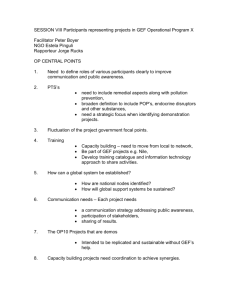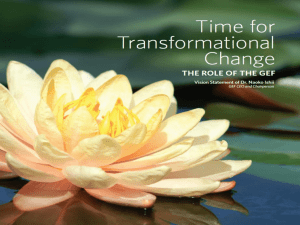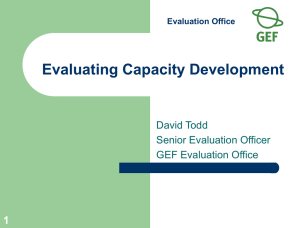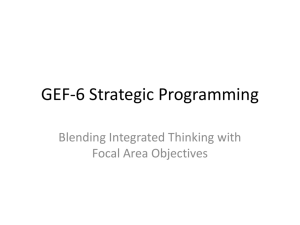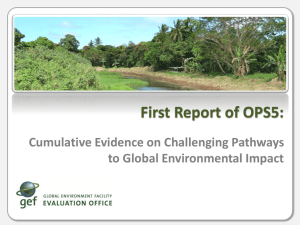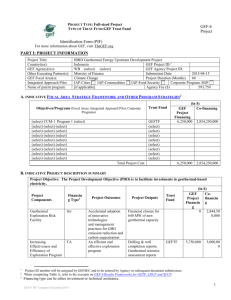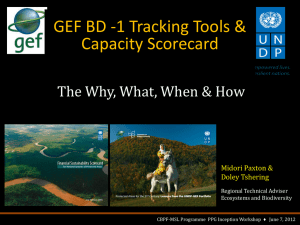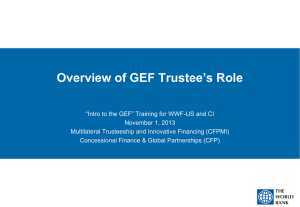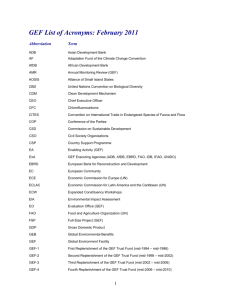GEF Policy on Gender Mainstreaming
advertisement
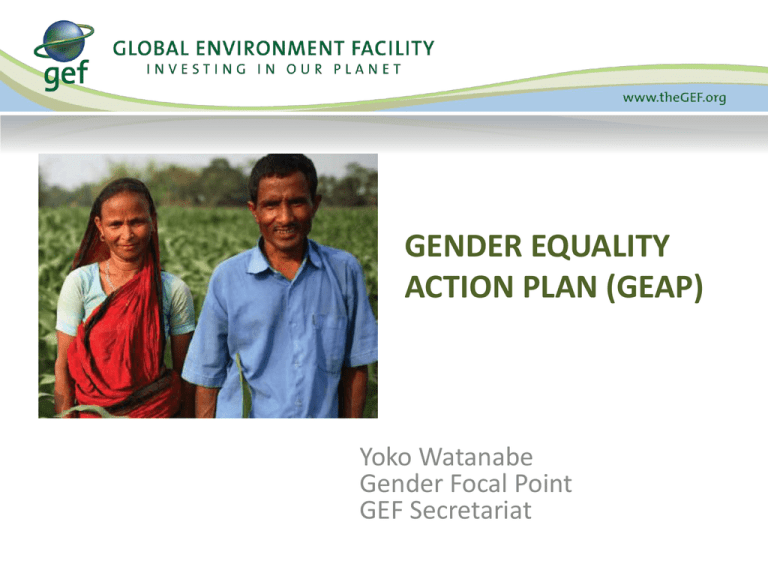
GENDER EQUALITY ACTION PLAN (GEAP) Yoko Watanabe Gender Focal Point GEF Secretariat Introduction GEF Policy on Gender Mainstreaming (2011) “The GEF recognizes that gender equality is an important goal in the context of the projects that it finances because it advances both the GEF’s goals for attaining GEBs and the goal of gender equity and social inclusion”. The GEF 2020 Strategy Commits to further strengthen GEF’s focus on gender equality and women’s empowerment. • GEF-6 Policy Recommendations: The GEF Secretariat, together with GEF Agencies and other relevant partners, develop an action plan on gender to enhance gender mainstreaming. GEF Policy on Gender Mainstreaming • Policy on Gender Mainstreaming (PL/SD/02) was adopted (2011) - GEF’s commitment to enhancing gender equality through GEF operations. - The Policy calls on the GEF Agencies to have policies, strategies, or action plans that meet the seven minimum standards: 1)Institutional capacity for gender minastreaming 2)Consideration of gender elements in project design, implementation and review 3)Undertake project gender analysis 4)Measures to minimize/mitigate adverse gender impacts 5)Integration of gender sensitive activities 6)Monitoring and evaluation of gender mainstreaming progress 7)Inclusion of gender experts in projects\ Progress to Date • Policy on Gender Mainstreaming • Gender approach and indicators in some focal areas • Revised project templates and review criteria • Gender in Results-based framework • Annual Monitoring Review on Gender • Appoint a Gender Focal Point • Assessment of GEF Agencies on Gender Mainstreaming Gaps and Challenges Gender integration varies between Focal Areas, GEF Agencies, and Projects: • Relatively strong in NRM and CCA projects (LD 82%, BD and IW 50%, CCA 40%) • OPS5: 73% of the gender-relevant GEF projects have addressed gender, but only 35% of them adequately addressed gender mainstreaming Some Reasons for the Gaps: • Lack of concrete guidance (e.g. project cycle, etc); • Limited analysis and approach identified by each focal area; • limited sharing of information and tools; • limited institutional capacity GEF Gender Equality Action Plan (GEAP) Concrete road map to implement the GEF Policy on Gender Mainstreaming that builds on the existing and planned gender strategies and plans of the GEF Agencies Goal: to operationalize the mainstreaming of gender in GEF policy and programming to advance both the GEF’s goals for attaining GEBs and the goal of gender equality and women’s empowerment. Duration: Initially during the GEF-6 period (FY15-18). Key elements 1. Project Cycle • Develop a Guideline on Mainstreaming Gender in GEF Project Cycle • Incorporate in Project Templates and Guidelines 2. Programming and Policies • Support gender responsive projects, based on country demand and GEF-6 Strategy • Mainstream gender in key GEF Strategy and Policy documents. 3. Knowledge Management • Enhance KM on gender equality, in line with new KM strategy (Knowledge products, webpage, etc) 4. Results Based Management • Strengthen GEF-wide accountability for gender mainstreaming by having Corporate and Focal Area level indicators and targets. 5. Capacity Development – Strengthen capacity at GEFSEC institution and staff levels, OFPs and partners at the country level GEF-6 Core Gender Indicators 1. 2. 3. 4. 5. Percentage of projects that have conducted gender analysis during project preparation. Percentage of projects that have incorporated gender responsive project results framework (e.g. gender responsive output, outcome, indicator, budget, etc). Share of women and men as direct beneficiaries of project. Share of convention related national reports incorporated gender dimensions (e.g. NBSAP, NAPA, TDA/SAP, etc.). Percentage of monitoring and evaluation reports that incorporates gender equality/women’s empowerment issues and assess results/progress. Thank you Contact: Yoko Watanabe Gender Focal Point ywatanabe@thegef.org
